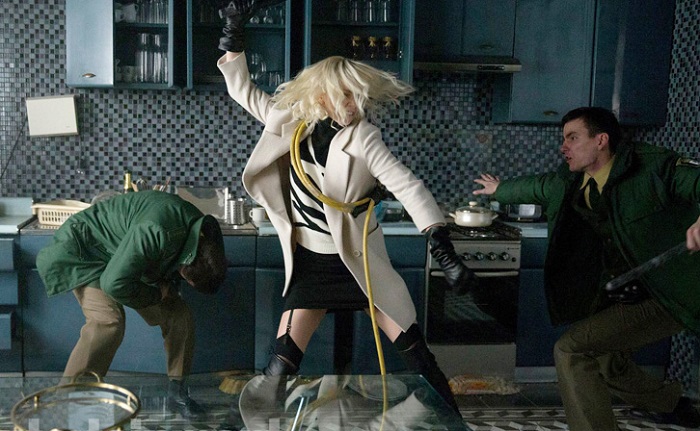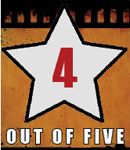

In cinema, there's a rich history of the "oner" — a long, continuous shot, usually tracking a single character, that is unabated by edits, effectively synchronizing the experience of both the subject the viewer. When they work, they're spectacular. Think Ray Liotta entering the Copacabana in Goodfellas or, more recently, the uninterrupted boxing match in Creed. With the rise of digital editing and effects, oners have grown more impressive, as computerized trickery can be used to stitch multiple shots together so that they appear to be one shot. That's how director David Leitch pulls off the oner in Atomic Blonde — an action sequence so spectacular it obliterates concerns over the parts of the movie that don't work so well (more on those later).
The shot begins with Charlize Theron, playing ass-kicking super spy Lorraine Broughton, getting off a hotel elevator and entering a hallway full of Russians ready to kill her. Immediately she's fighting for her life, and the sequence — which feels like it must be 10 to 15 minutes long — follows Theron as she furiously assaults a series of henchmen through the hallway, down a stairwell and into the streets, before she jumps into a car and the oner seamlessly evolves into an automobile chase and shootout on the streets of Berlin. It's magnificent, truly an action scene for the ages.
The rest of the movie? It's pretty solid. There are some other impressive fighting bits, during which Theron gives it her all. And Atomic Blonde is certainly a stylish film. Standard blue-filtered cinematography gives way to colorful neon highlights in key scenes. Close-ups of Theron's bruised and battered face as well as shots of her emerging nude from an ice-filled bath carry an artistic agenda, making Atomic Blonde feel like an action film for the indie crowd. It's all gorgeous to look at, and not just because the film's star remains one of the most striking humans on the planet.
The plotting is where Atomic Blonde has been losing some people, and it's an understandable concern. For starters, events are set in motion thanks to that most-tired of spy-movie cliches — a list of undercover agents has been stolen and is being sold to the highest bidder. It's up to Broughton, a top MI6 agent who plays things close to the vest, to secure it before hundreds of spies in the field are burnt. Particularly of interest to the British is a troublesome double-agent whose identity is revealed on the list. Could it possibly be the unhinged station chief played by James McAvoy? Maybe, as his alliengences always seem to be shifting.
Broughton's mission expands when it's revealed that the list's previous owner has the whole thing memorized, demanding his protection as well. All of this is set within a time-shifting framing device that has Broughton being debriefed by both her MI4 superior (Toby Jones) and a CIA bigwig (John Goodman). And, beyond that, the film is set in Germany on the eve of the fall of the Berlin Wall, which Leitch and screenwriter Kurt Johnstad lean on heavily in an attempt to add texture to the conventional and sometimes confusing story.
Long story short: It doesn't entirely work, but it works enough. The plotting isn't more troublesome than it is in most of the Mission: Impossible movies, and I'd take it over the dull turn into "Your own past is your real enemy!" that the last few Bond films have taken. Atomic Blonde is more about style and mood rather than story anyway. By embracing its R rating, it's also about sex in a way the Bond and M:I films can only ever safely allude to. Theron is in full control of her body in every way in this movie: it's both desired and feared. And her sex scene with Sofia Boutella's neophyte French spy is one of the hottest in a major release in recent memory. (It also ends with the movie's biggest laugh!)
Leitch co-directed John Wick — still the best action film released in the 2010s — but let his cinematic partner, Chad Stahelski, film that movie's sequel while he jumped over to Atomic Blonde. This isn't as good as Wick (or Wick Deux), but when you consider Blonde along with Edgar Wright's Baby Driver … it's proving to be a hell of a summer for action films that lash out at the paradigm big-budget, studio action films often feel stuck in.











